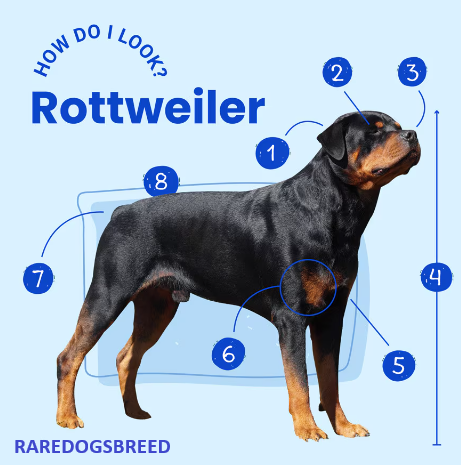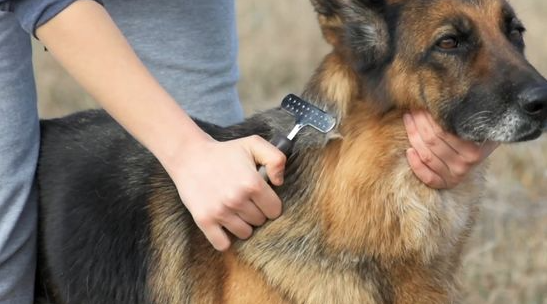Rottweiler
Table of Contents
Rottweilers are a beloved breed, known for their strength, loyalty, and intelligence. From Rottweiler puppies to adult dogs, this breed has captured the hearts of many. Whether you’re drawn to their cute looks as puppies or their sturdy, majestic appearance as adults, Rottweilers are an intriguing breed that requires proper care and understanding. In this guide, we’ll explore their temperament, health conditions, grooming needs, and nutrition, providing essential information to ensure your Rottweiler thrives.
Rottweiler Temperament & Personality
Rottweilers are known for their protective nature, intelligence, and affectionate loyalty toward their family. They are generally calm, confident dogs that require a firm, consistent hand in training. Despite their tough exterior, they are incredibly loving and form strong bonds with their owners.

Training Tips for Rottweilers
Training a Rottweiler is crucial, especially since they are large, powerful dogs. Early socialization is key to developing a well-behaved adult dog. Start training your Rottweiler puppy from a young age, using positive reinforcement techniques such as treats and praise. Rottweilers respond best to consistency and a clear understanding of boundaries. Commands like “sit,” “stay,” and “come” should be mastered early, with advanced training such as leash walking and recall following suit.
Obedience training is essential to curb any undesirable behaviors. A well-trained Rottweiler can be a joy to have, as they are naturally eager to please their owners. Enrolling in obedience classes can also help reinforce good behavior and offer opportunities for socialization.
Exercise Needs for Rottweilers
Rottweilers are an active breed that requires regular exercise to stay healthy and happy. Daily walks of at least an hour are recommended, along with playtime in a fenced yard. Due to their size and energy, They are thrive with activities that challenge both their physical and mental abilities.
Activities such as agility training, hiking, and even swimming can provide great outlets for their energy. Mental stimulation is just as important, so incorporating training sessions or puzzle toys can help keep them engaged.
Keeping Rottweilers Happy
A happy pet dog is one that feels loved and mentally stimulated. Rottweilers enjoy being part of the family, so spending time with them and involving them in daily activities is essential. Providing clear guidance and setting boundaries help them feel secure. They are also known to have a strong work ethic, so giving them tasks like fetching objects or herding (if on a farm) can bring them joy.
Game Ideas for Rottweilers
Rottweilers love to play! Tug-of-war, fetch, and hide-and-seek are some of their favorite games. They also enjoy puzzle toys that challenge their intellect. When playing, it’s important to ensure that the games are safe and don’t encourage overly aggressive behavior. Interactive toys, such as treat-dispensing puzzles, can keep them entertained for hours and provide much-needed mental stimulation.
Common Rottweiler Health Conditions
Rottweilers, like many purebred dogs, are prone to certain health conditions. Regular veterinary check-ups and preventative care can help catch and manage these issues early on.
Dental Issues in Rottweilers
Dental problems are quite common in Rottweilers. Plaque and tartar buildup can lead to gum disease, tooth decay, and even tooth loss. Regular brushing is crucial to maintaining good oral hygiene. Additionally, providing dental chews and toys can help clean their teeth naturally.
In severe cases, dental problems can lead to infections that affect other organs, including the heart and kidneys. Routine dental cleanings by a veterinarian are recommended to prevent these more serious complications.
Ear Disorders in Rottweilers
Rottweilers are also susceptible to ear infections, especially due to the shape of their ears, which can trap moisture. Regular ear cleaning is important to prevent the buildup of wax and dirt, which can lead to infections. Signs of ear problems include head shaking, scratching at the ears, and foul odor coming from the ear canal.
If you notice any of these symptoms, it’s important to consult a veterinarian for treatment. Chronic ear infections, if left untreated, can lead to hearing loss and severe discomfort.
Gastrointestinal Disorders in Rottweilers
Rottweilers can suffer from gastrointestinal issues, including bloating, a condition known as Gastric Dilatation-Volvulus (GDV). This can be life-threatening if not treated promptly. Symptoms of bloating include a swollen abdomen, restlessness, drooling, and unsuccessful attempts to vomit.
Feeding your Rottweiler smaller meals throughout the day, rather than one large meal, can help reduce the risk of bloating. Avoiding vigorous exercise immediately after eating is also recommended.
Rottweiler Grooming
Despite their short coat, Rottweilers do shed and require regular grooming to keep their coat healthy. Grooming your Pet dog doesn’t need to be a difficult task, but it’s important to stay consistent with it.
Coat Care
Rottweilers have a double coat, with a short, dense undercoat and a thicker, smooth topcoat. Regular brushing helps remove loose hair and keeps the coat looking shiny and healthy. Brushing also helps distribute natural oils throughout their coat, which can keep their skin healthy and reduce shedding.
During seasonal changes, particularly in spring and fall, Rottweilers shed more, so brushing more frequently during these times is advised.
Bathing
Rottweilers don’t need frequent baths—once every couple of months is usually sufficient, unless they get especially dirty. Use a gentle dog shampoo to avoid drying out their skin. After bathing, make sure to thoroughly dry their coat to prevent moisture from being trapped, which can lead to skin infections.
Ear and Dental Care
As previously mentioned, regular ear cleaning is important to prevent infections. Additionally, brushing your Rottweiler’s teeth at least twice a week can help prevent plaque buildup and dental disease. Dental chews or toys can also supplement brushing, helping to keep their teeth clean and their gums healthy.
Nail Trimming
Rottweilers’ nails can grow quite fast, and long nails can cause discomfort or even injury. Regular nail trimming is important to keep their paws healthy and prevent overgrown nails from cracking or splitting.
Rottweiler Nutrition
A balanced diet is essential for maintaining a healthy and active Rottweiler. Their nutritional needs will vary depending on their age, weight, and activity level.
Best Diet for Rottweilers
Rottweilers thrive on high-quality dog food that provides the right balance of protein, fats, and carbohydrates. Protein is particularly important to support their muscle mass, while healthy fats provide energy. Look for dog foods with meat as the primary ingredient and avoid products that contain excessive fillers like corn or soy.
It’s also important to choose a dog food that is specifically formulated for large breeds, as these contain the right balance of nutrients for a Rottweiler’s size and energy needs.
Foods to Avoid
Certain foods can be harmful or even toxic to dogs, including Rottweilers. Common foods to avoid include chocolate, grapes, onions, and garlic. Additionally, fatty foods or foods high in salt can lead to obesity or other health problems, so it’s best to stick to a balanced, species-appropriate diet.
Human food should generally be avoided, but healthy treats like carrots or small pieces of apple can be offered in moderation.
Supplements for Rottweilers
Some Rottweilers may benefit from dietary supplements, especially as they age. Glucosamine and chondroitin can support joint health and help prevent arthritis, which is common in large breeds like Rottweilers. Omega-3 fatty acids are another great supplement to support skin and coat health, as well as reduce inflammation.
If you’re unsure whether your Rottweiler needs supplements, it’s best to consult with your veterinarian to develop a tailored plan.
Conclusion
Rottweilers are a remarkable breed with a unique combination of strength, intelligence, and loyalty. Whether you’re raising a Rottweiler puppy or caring for an adult dog, understanding their temperament, common health conditions, grooming needs, and nutrition is essential for ensuring their well-being.
With proper training, socialization, and care, Rottweilers can be loving companions and protective members of the family. By addressing their health needs early and providing them with a balanced diet and adequate exercise, you’ll set your Rottweiler up for a long and happy life.




